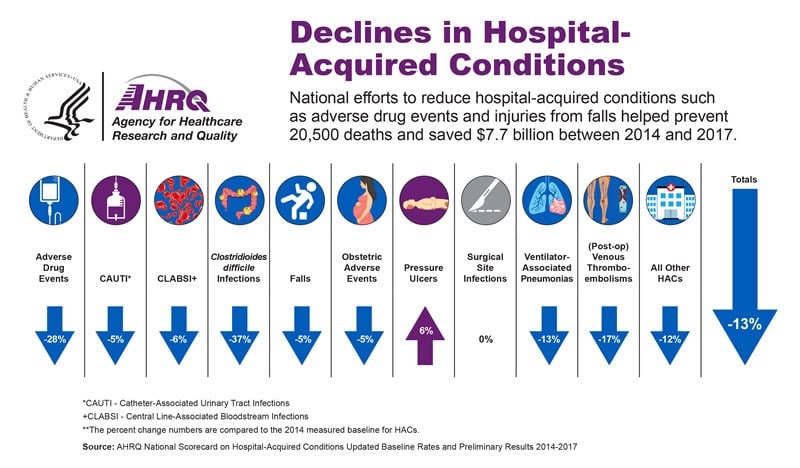HEALTHCARE QUALITY WEEK IS TAKING PLACE
OCTOBER 20TH-26TH, 2019.
Healthcare professionals provide essential roles and help to improve outcomes, decrease inefficiencies, and reduce costs. Many times in the busy day to day healthcare world, these actions can go unnoticed. The National Association for Healthcare Quality (NAHQ) promotes National Healthcare Quality Week as a way to bring recognition to the contributions healthcare professionals make each and every day.
“Healthcare quality professionals are invaluable to the success of an organization, and they are continually looking for the next improvement opportunity,” says NAHQ President Nancy Curdy, MSN MS-HQPS RN CPHQ CPPS. “In the fast-moving and complex healthcare environment that we work in, it’s essential to have trained and qualified professionals, specifically focused on systems and processes and methods of measuring, analyzing, and improving them to achieve best outcomes.”
From the below data, it is apparent that healthcare professionals are working hard to improve healthcare outcomes by effectively monitoring and analyzing existing, new processes and outcome measures. As new evidence-based practices are implemented into healthcare delivery, we will continue to see improvements.

Even though we are making progress in many ways, there are still large areas that need improvement. Healthcare Quality Week helps us to not only highlight the achievements we have made but also focus on improvements that must happen.
It’s estimated that one in 25 hospitalized patients will acquire an infection (CDC, 2017). This is a frightening statistic, especially for elderly patients who are at higher risk of acquiring infections. Patients and family members should not have to deal with this as a possible fear when going through a stressful time in their lives.
WHAT CAN BE DONE?
It is important that your clients and their families are educated about playing a role in ensuring the safety of their hospitalized loved ones. They need to ask questions so they fully understand any medications being prescribed or procedures being performed.
They have the right to understand safety procedures within a hospital, skilled nursing facility or long term care facility. By providing them with questions to ask and areas to be aware of, you are arming them with the tools they need to advocate for themselves or their family members, which can in turn help to provide extra safety.
Setting up and coordinating at home services after discharge can also help to decrease the length of stay within the hospital; ultimately decreasing your clients risk to infection. The longer a client is in the hospital, their risk for acquiring an infection increases dramatically. Your efforts of coordinating at home services can help to lessen family stress, decrease hospitalization stays, decrease the risk of your client acquiring infections as well as reduce overall healthcare costs.
WAYS YOU CAN EDUCATE YOUR CLIENTS AND THEIR FAMILIES:
- Educate your patients on what Healthcare Quality Week is.
- Help them find healthcare data specific to their providers.
- Provide essential questions that clients or their families should be asking during doctor visits or hospitalization stays.
- Discuss with the clinical team any changes or progress that is being made and then relay that information to your client and their family. Having an advocate can increase communication between clients and the clinical team, enhance clinical care and ensure the overall safety of your client.
- Set up home care services as soon as possible to reduce the chance of an infection being acquired.
WHAT YOU SHOULD DO FOR YOURSELF:
- Analyze the statistical data for your company or organization you work for.
Identify ways you can help to improve those statistics. - Give yourself a pat on the back for the improvements that have been made!
Take a complimentary webinar that NAQH offers here to continue learning and growing: https://nahq.org/education/webinars - Download a Healthcare Quality Week Photo from NAQH and post them on social media with the hashtag #HQW2019.
- Attend a Healthcare Quality week event or connect with colleagues to have your own and celebrate all of your victories!
Post in the comments below how you’re planning on celebrating Healthcare Quality Week and share with us what tools you are providing to your patients!
SOURCES:
Declines in Hospital-Acquired Conditions. (2019) Retrieved from https://www.ahrq.gov/data/infographics/hac-rates_2019.html
Healthcare Associated Infections (HAIs). (2017) Retrieved from https://www.cdc.gov/winnablebattles/report/HAIs.html








Leave a Reply